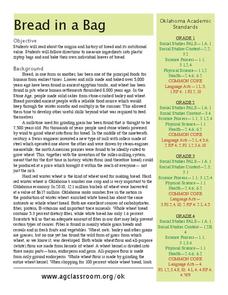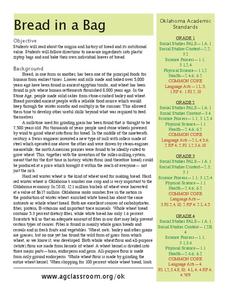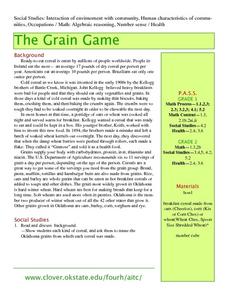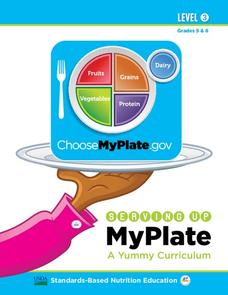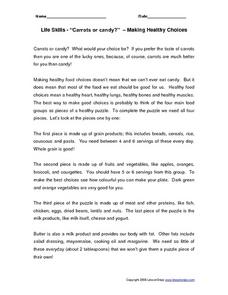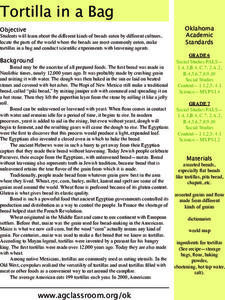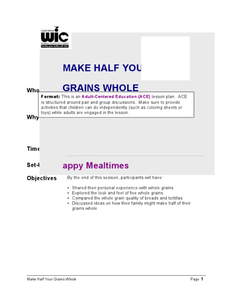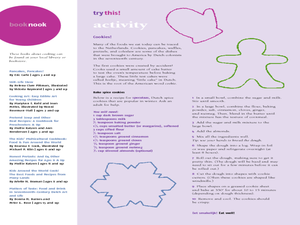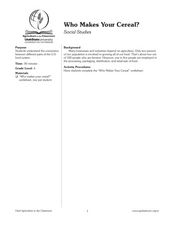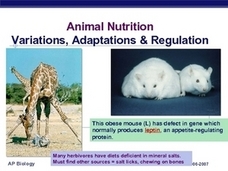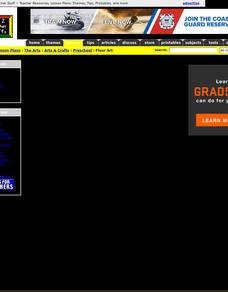Curated OER
Bread in a Bag
Could the history of bread really be interesting? Yes, it could! An informational text gives scholars wheat production background from 8,000 years ago, discussing different types of bread and the current industry in Oklahoma. Learners...
Curated OER
Bread in a Bag
Students explore wheat. In this bread making instructional activity, students make their own loaf of bread and discover the history behind wheat. They work in pairs to follow step-by-step instructions for making the bread. This...
Curated OER
The Grain Game
Students read and discuss origin of cereal, use pieces of cereal made from grains grown in Oklahoma to play counting game, name their favorite breakfast cereal, guess which grains are used to make their favorite cereals, and read...
Curated OER
Grains Vocabulary
In this grains worksheet, students look at pictures and identify what the different pictures of grains are. Students complete 4 multiple choice questions.
US Department of Agriculture
Serving Up My Plate
Within three nutrition-themed, inquiry-based learning opportunities, pupils take notice of their eating habits; delve deep into the five food groups, gain experience in planning meals, participate in a taste test, and explore ads...
Curated OER
Life Skills-"Carrots Or Candy?"- Making Healthy Choices
In this healthy food choices instructional activity, students label and color 4 puzzle pieces to represent the food groups. Then students complete a graphic organizer filling in the food group headings and food items that fit in each...
Curated OER
Tortilla in a Bag
An engaging, and interesting lesson of types of bread found around the world awaits your charges. In it, learners compare and contrast manjy types of breads that come from cultures all over the globe. They utilize worksheets embedded in...
Curated OER
How Many Jobs In A Loaf Of Bread?
Students develop career awareness and skill building for job performance. After completing an inventory of interests and skills, students link their career choice to a the agricultural components contained in their choice. Thy determine...
Curated OER
Make Half Your Grains Whole
Students discuss the benefits of eating whole grains. In this adult health activity, students compare samples of whole grain food products. They recommend ways on how to incorporate whole grains in their family diet.
Curated OER
Quick Breads: A Practical Application
Apply food selection and preparation guidelines related to quick breads, rice, grains, and pasta. National Standard 14.3.3 Identify basic cooking techniques related rice, grains, and pasta Identify examples of quick breads: muffins,...
Curated OER
Breads Around the World
Pupils read about bread. In this lesson studying bread, students read about the history of bread and it's significance around the world. Pupils identify the three main crops used to make bread and ten common types of bread from different...
Curated OER
Flour Art
Students create pictures using white and whole wheat flour, oatmeal, and cornmeal while learning the different types of grains used to make breads.
Curated OER
Bread in a Bag
This lesson plan focuses on making bread, but also spends some time on the origins of wheat. In order to make the bread, each class member receives a kit full of the materials they will need. Included here is a detailed list of...
Curated OER
The Little Red Hen
Young readers access prior knowledge of how wheat becomes bread. Using "The Little Red Hen" story, learners make predictions of the events. Extension activities include singing a song about the story and making a list of...
Curated OER
Introduction to Nutrition
Fourth graders take a closer look at the foods they eat and the nutritional value of each. This lesson helps them see why foods are grouped together the way they are and what types of nutrition are provided by these food groups. They...
Curated OER
ABC Toast
Students use a little milk mixed with food coloring to paint on the first letter of each child's name, their whole name, or another letter of their choice. In this art lesson, students butter the bread and sprinkle it with cinnamon-sugar...
Curated OER
Paintings of food
Students study and discuss the paintings of different foods. In this food lesson plan, students read about paintings that are of treats, banquets, feasts, arrangements, and more, and then make cookies.
Curated OER
Who Makes Your Cereal?
Fourth graders investigate how cereal is produced. In this agricultural lesson, 4th graders discuss where ingredients in cereal come from. Students use picture cards to identify the steps in producing cereal.
Curated OER
"Cereal" Comic Strip
Students discuss how wheat is important to our everyday lives, from food to insulation, focusing on how wheat grains are processed into food items. Students then create a comic strip of the steps of processing grain to demonstrate...
Curated OER
Alcoholic Fermentation in Yeast
Biology learners investigate the effect of sucrose concentration on yeast alcoholic fermentation. During the lesson,they compare and contrast the processes of cellular respiration and alcoholic fermentation. They design an experiment to...
Curated OER
Animal Nutrition - Variations, Adaptations, & Regulation
Colorful pictures and graphics make this a visually-appealing presentation on animal nutrition. Be aware that two of the sixteen slides include blank graphic organizers, so you will need to find the other existing version of this...
Curated OER
Why is Rice Good for Us?
Third graders explore why rice is good for our bodies. For this nourishment lesson, 3rd graders review the food pyramid and discuss serving sizes. Students discuss the different ways rice is used in food. Students use uncooked rice to...
Curated OER
Flour Art
Students create pictures using white and whole wheat flour, oatmeal, and cornmeal while learning the different types of grains used to make breads.
Curated OER
4-H Nutrition/Health/Fitness- Intermediate Leader's Page
Have some fun with healthy living in 4-H! Through several activities, young members learn about healthy eating, basic first aid, and fun exercise options. Of course, service ideas are outlined to extend learning. Students use websites to...


